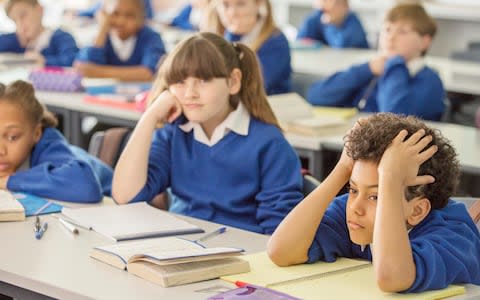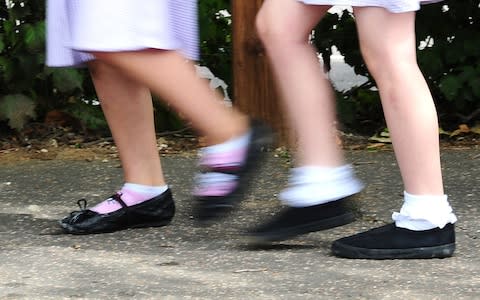Bad behaviour alert: the classroom apps that ping your child's in-school antics straight to your phone

Until relatively recently, a pupil’s behaviour at school was recorded by the simple process of a teacher putting pen to paper. In extremis, the parents would be summoned in person and appraised of their child’s misdemeanours. But paper, it seems, is fast falling out of fashion.
As the creeping domination of our lives by smartphones proceeds unchecked, its spread to schools was always inevitable. And so today, in lieu of the outmoded report card, a growing number of parents now receive alerts about the minutiae of their child’s performance via their phones, often multiple times throughout the day.
Has little Barnaby been sitting nicely on the mat this morning? That’s one point for him on the behaviour-tracking app, installed on his mother’s phone so she can know just how impeccably he’s comporting himself while she rushes to her morning meeting. Has Sophie been talking too much when she should have been listening? Sophie’s father is about to find out via an afternoon alert.

Some 70 per cent of UK schools have apparently signed up to one app in particular, ClassDojo, which updates parents throughout the day, not only about how their children are behaving but also by sharing photos and videos of “wonderful classroom moments.” Another online system with a pupil-tracking function, Go 4 Schools, serves to “capture, analyse and share classroom data in real time”. An app is currently in development, which will include live alerts about student absences, among other things.
For many teachers, the replacement of mountains of paperwork with streamlined digital communications is appealing. “We don’t want teaching to be the luddite profession,” says Geoff Barton, the general secretary of the Association of School and College Leaders. “If the parent can see what work the child is being given it’s a big motivator for them to take an interest in their child. It gives them something tangible to look at.”
Until this Easter, Barton was headteacher at King Edward VI School in Bury St Edmunds, Suffolk, where the Go 4 Schools software had been successfully introduced, providing parents with information about homework, attendance, behaviour and lateness.
“Parents loved it,” Barton says. “The only problem with it is it can raise expectations a little too high because they then start saying ‘can we have every single piece of work?’ and I do think it’s important children have school away from parents and we don’t see it as an extension of somewhere they can be monitored from home.”
Not all teachers are enamoured of the idea. Alex, a teacher at a London preparatory school that has not yet introduced any classroom apps, is among those to express reservations. “Teachers need time to reflect and time to consult other teachers to gain context [when assessing pupils’ behaviour],” she says. “Communication with parents is highly sensitive and needs to be considered. I think I would find it a distraction, too.”

Among parents, reaction to the new tech has been mixed. While many have embraced it and spoken positively about how it has opened up channels of communication between their children’s teachers and themselves, others have been notably warier.
One mother with a child in Year 1 at a primary school that has introduced ClassDojo wrote on parenting forum Mumsnet: “It seems to have zapped his confidence and he is questioning whether he is ‘a good boy’ or indeed ‘good enough’ when he sees other getting points. We are raising him to be self-motivated, and to work hard for himself, not for an external reward. I’m worried that this system will undermine this.”
Other parents have cast doubt on the usefulness of information given to them. One mother of two boys at schools using the apps says: “At first I thought they were a good idea but the trouble is, I might be told my son has been ‘disruptive’ in class or that he’s been awarded a point for taking initiative, but I have no idea in what context any of this has happened and whether he is being singled out or if everyone in the class has been given a point.
“I also wonder how much time the teachers must have to spend inputting all this data for 28 kids. Couldn’t they be doing more art, music or drama in that time instead, since we’re told they lack time for those things?”
A separate set of concerns centres around data protection issues. Barton, however, says safeguards are in place. “Unless you were incredibly squeamish about your child getting an ‘E’-grade and someone breaking into the account and seeing that, there’s no personal information there. Schools are incredibly aware of data protection.”
ClassDojo, likewise, has sought to allay any fears, stating that information is never sold or rented to third parties and that parents or students can request that their accounts be deleted.
Go 4 Schools said care was taken to ensure the data held was secure and only retained for the appropriate amount of time. It also rejected the notion that inputting all the information in the system took up a lot of teachers' time.

"Schools simply wouldn't have time to do it if it did," says a spokesman. "It is important to realise that most behaviour recorded in schools is positive, and is recorded to make sure it is recognised and celebrated by school staff, the students themselves and their parents. Recording the positives is really important as it helps the school have a 'balanced' conversation about behaviour with students and parents. It is generally quicker and easier to record 'positives' than 'negatives' because positives usually don’t require any particular follow-up - they are just recorded. Online systems make it quicker and easier to record the positives than a paper-based system, and we think that is a real benefit."
On the question of whether comparing children's data could fuel insecurities, he pointed out: "Schools would be able to do this regardless of how behaviour is recorded; it isn't something made possible only by using online systems."
As for the gradual substitution of face-to-face interaction by virtual contact, Barton suggests the technology worked well in his experience: “as long as it wasn’t replacing human contact and teachers saying ‘you’re doing a great job, well done.’”


